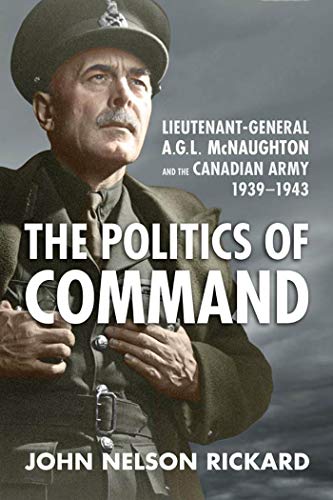
The Politics of Command
by John Nelson Rickard
"Lieutenant-General A.G.L. McNaughton and the Canadian Army, 1939-1943"
Popularity
0 / 5
* A book's popularity is determined by how it compares to all other books on this website.
Where to buy?
Buy from Amazon* If you buy this book through the link above, we may receive a small commission at no extra cost to you.
The Politics of Command by John Nelson Rickard
Details
War:
World War II
Perspective:
Commanders
Biography:
No
Region:
Europe
Page Count:
417
Published Date:
2010
ISBN13:
9781442640023
Description
Brief Summary
The Politics of Command by John Nelson Rickard delves into the intriguing circumstances surrounding the resignation of Lieutenant-General A.G.L. McNaughton from the command of the 1st Canadian Army in December 1943. The book explores McNaughton's tenure during the first part of World War II, scrutinizing his leadership capabilities and contentious personality. Rickard provides a detailed analysis of McNaughton's performance, specifically focusing on his conduct during exercise SPARTAN in March 1943. The author re-evaluates McNaughton's associations with significant military figures, challenging the long-held beliefs about the reasons for his dismissal. This comprehensive study seeks to offer a fresh perspective on McNaughton's impact on both the Canadian Army and military history.
Main Themes and Topics
The book primarily focuses on the themes of leadership, military strategy, and the interpersonal dynamics within the high command. It examines how McNaughton's leadership style and decision-making processes affected his standing within the military hierarchy. Another central topic is the analysis of exercise SPARTAN and its implications for McNaughton's career. Through detailed historical records, Rickard presents an argument for reevaluating the historical narrative surrounding McNaughton's resignation, aiming to provide insights into the politics and power struggles within the military during World War II.
Writing Style and Tone
Rickard employs a meticulous and scholarly writing style, as befits a work of detailed historical analysis. The tone is analytical and objective, driven by a rigorous examination of historical documents and personal correspondences. The author balances technical military analysis with accessible narrative, making the content engaging for both military historians and general readers interested in World War II history.
Criticism
Some readers may find the book's dense focus on military strategy and high-level diplomatic interactions challenging, especially if they lack a background in military history. The book's depth and detail might be overwhelming for those seeking a more general overview of McNaughton's biography or the broader context of the Canadian Army during the war. However, these criticisms are somewhat mitigated by Rickard's clear presentation and logical argumentation.









